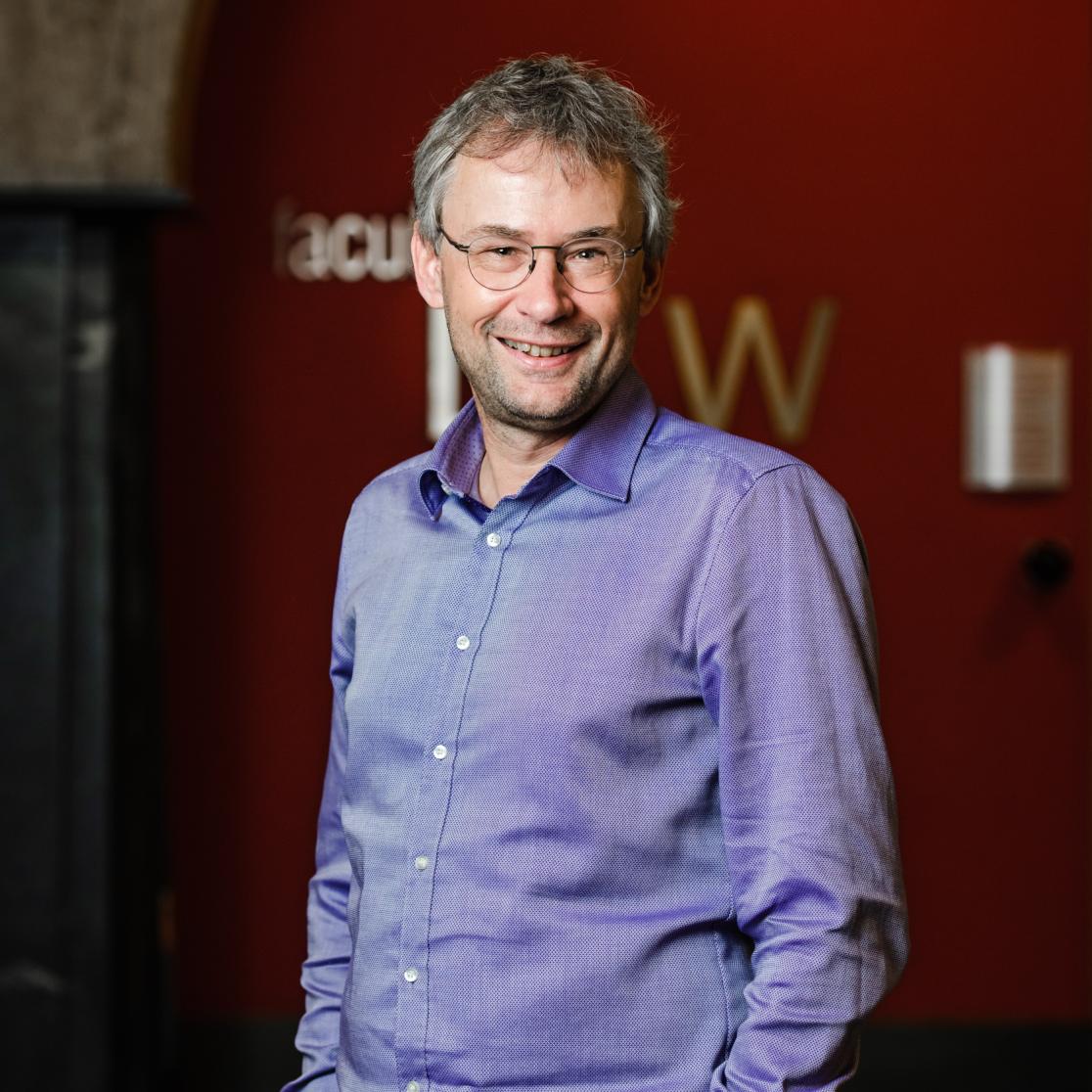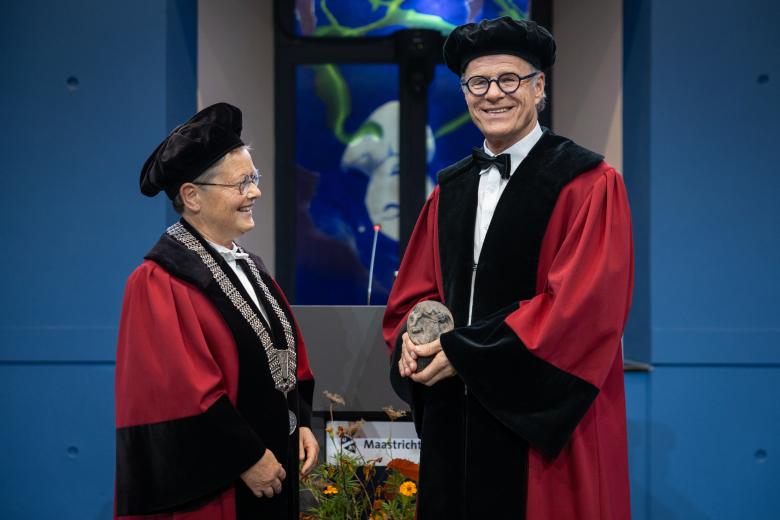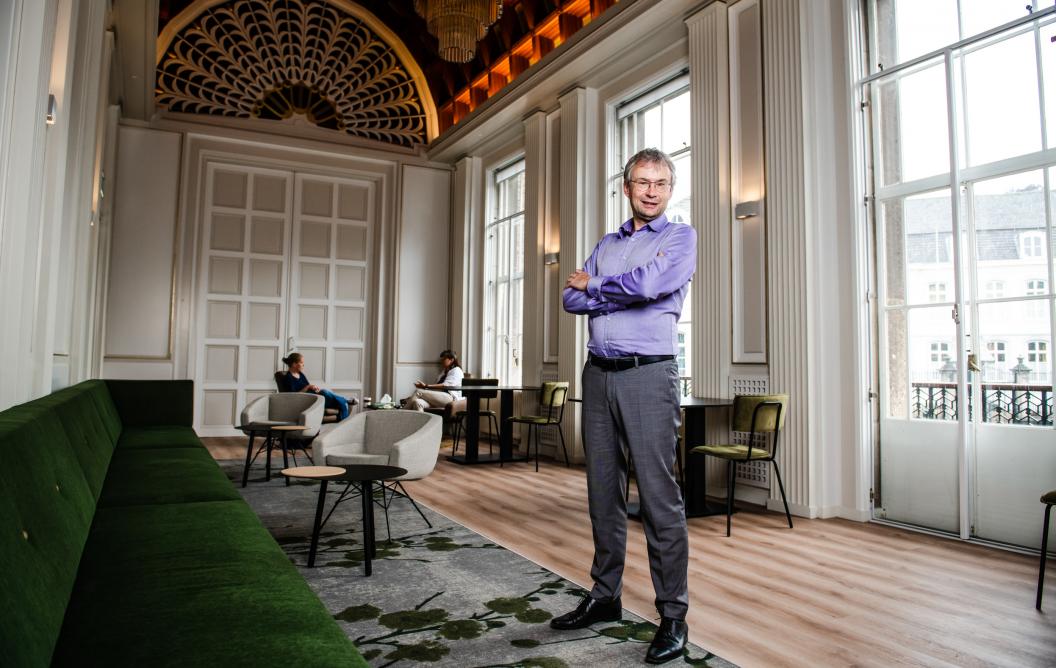Dean Jan Smits: legal nerd who doesn't shy away from obstacles
It is 1986. The time of Grandmaster Flash and Run-D.M.C., but also of Billy Oceans' When the going gets tough, the tough get going and a harsh Elfstedentocht’. In Leiden, Jan Smits starts studying law at a sizeable faculty with 1200 first-year students. It’s a big contrast to the small-scale law faculty in Maastricht where he became dean in 2017. “My work is like a trail run. You never know what will come after the next obstacle.”
Captivated by the law
In the large lecture hall at Leiden, the teacher is literally and figuratively quite distant from the student. “I didn't find my studies very interesting during the first two years. It was only when I was able to start researching and writing that I became captivated by the law. I can still remember it well. It was during the Practicum Burgerlijk recht. I made myself at home in the library. There, I applied the rule that you need 10,000 hours to become good at something. I was a real legal nerd”, he laughs. He also was a member of the student association Augustinus. “It was nice, but I wasn't very active.” The law has him in its grip forever.
His choice for Maastricht
Jan made private law his area of expertise. He worked as a professor at Tilburg and Maastricht for 18 years and then he became dean in 2017. “I liked the idea of doing something different after years of teaching and research”, he says. His choice for Maastricht didn’t necessarily have to do with the small-scale teaching that was so hard to find in his own student days. “No, for me it was more about the international approach to law in Maastricht. That was new in the Netherlands at the time, and even now we are leading the way in this regard.” Traditionally, the law has been determined at a national level, but for about 25 years now there has been much more legal interaction between the Netherlands and its surrounding countries. This led to the emergence of the European Law School at the end of the 1990s. “That’s what attracted me to Maastricht in particular. I’m proud of the internationally relevant position our faculty has.” And yet, he does not forget about national law. “We intentionally focus on two tracks. For instance, with the renewed bachelor’s programme in Dutch Law, we demonstrate that we consider Dutch law and Dutch-language education to be just as important.”
‘My work is not yet finished’
About his work as a dean, Jan says, “It’s my role to create the conditions so that academic and support staff can flourish in their careers. This is only possible if you yourself know what it’s like to teach and do research. This is why deans always come from the ranks of academics.” After four years, he was supposed to return to teaching and research. “Yes, that was the intention, but I’ve been reappointed in the meantime”, he laughs. Then he says with determination, “My work is not yet finished. Although, you can of course ask yourself if the work of a dean is ever finished.” Doesn’t he miss research and teaching? “I don’t miss it enough, and that surprises me. Four years ago, I actually thought I would. I think I'm too busy and don't have time to miss it. Besides, being a dean is a fantastic job.”
Clash of opinions
He may not be itching to get back to research just yet, but Jan likes to think about what constitutes ‘good research’. “It can be done in different ways. Legal research must stimulate others. It should be creative, original and add value. In recent years, research into Dutch law, written in Dutch and published in Dutch academic journals, has been seen as less interesting in Dutch academia. International, interdisciplinary research is more highly regarded. But in my opinion, this says nothing about the quality.” Fortunately, the law faculty has a very diverse staff, according to Jan. There’s a wide array of different types of research, which can sometimes clash quite substantially. “We are a community and I stimulate academic debate. You have to; that is the essence of legal scholarship—as long as you bring reasoned opinions to the debate. I believe that academia is about that clash of opinions."
Satisfied?
His work may not be finished yet, but he can still check off some of the tasks he set for himself when he was appointed. “Thanks to the Bachelor's programme in Dutch Law being renewed, it has a more distinct identity. It looked just a bit too much like the other nine bachelor’s programmes in the Netherlands. Now, it's really different here than everywhere else.” Mission accomplished. Another ambition in the strategic programme was to modernise the HR policy. “We want to attract and retain good people. This is also about creating the necessary conditions for people to flourish. In this respect it is helpful that our financial position is healthy.” In the meantime, more than 40 new assistant professors have been employed. And that was badly needed to cope with the faculty’s growth spurts. As far as the students are concerned, they will likely not even notice this, as the tutorial groups will remain small-scale. So, is there a satisfied man here? “No, that’s not in my nature. The high work pressure is still a concern and a priority for me—especially when I see the young talent, the assistant professors, who have to juggle many different things. It’s often thought that, as an academic, you have to be able to do everything, but that’s not true. Not everyone is capable of growing into a higher position and they don't have to. That's why we have to value people and at the same time look at the differentiation of functions.”
Hip hop & law
Of course, we have to talk about that damned virus. “In the beginning, my biggest fear was that it would mean the loss of the special community we have at the faculty. If you walked through the corridors here before the pandemic, you heard Dutch, English, German, Italian. It was a mix of students and staff, with a unique atmosphere. We would always hear about that from new students, too.” Throughout the lockdown, the faculty has tried to organise as much contact as possible with the staff. Weekly Zoom meetings are organised for more than 300 staff members. Experiences are shared and there are speakers. Education has moved online; everything happens from home. This is often complicated and difficult. As soon as it was allowed again, we started encouraging students to come to the faculty again. “We have recently been organising the Law Open Air Festival”, Jan explains enthusiastically. “Here, colleagues are able to talk about a book they have recently read or about their favourite jurist, for example. We serve chips and soda to compensate a bit for all the hardships the students have to endure.” Jan kicked off the festival himself. “I spoke about hip hop and the law. In 2017, I did research on what jurists can learn from hip hop lyrics. They are often about anger, injustice and growing up in a poor environment. Also, taking the law into one’s own hands and revenge are recurrent themes.” The reactions were positive and people are interested in participating again next time. The Law Open Air Festival, however, remains exclusively for law students.
'Civiel effect' as a reality check
The combination of law with other disciplines, or with hip hop if you will, is not new. The ‘T-shaped lawyer’ now has a central place in the renewed Dutch Law bachelor’s programme. “There are various methods for resolving or preventing conflicts. That's why we look beyond law, to psychology and negotiation skills, for example.” How do you strike the right balance in this to ensure that law still remains the focal point? “Fortunately, we have the 'civiel effect' for that. We have to meet a number of requirements to enable our students to gain access to the legal profession and the judiciary. That’s not an obstacle for me, and I think it's good that we have this. It’s our reality check. If you do away with it, an admissions test will probably take its place. You also see that in other countries.”
The dean as a trail runner
Time for the final question. In his limited amount of free time, Jan regularly goes running—not the obligatory jogging route, but trail runs. Is his work like a sprint or more like an endurance run? “I always look at the long term, so it’s definitely endurance. The great thing about a trail run is that you never know beforehand what you are going to encounter—mud, obstacles, people you have to support to pull through. You have to get past everything to be able to move forward. You never know what will happen next; it’s not predictable. And that’s exactly what I like about my work.”
By: Karin Somers (text) Casey O'Dell (translation) and Jonathan Vos (photography).

Teamwork
Jan regularly remarks that he obviously does not do the all the work for the faculty by himself.
“It really is teamwork. If you change something, you should try to do it together with as many people as possible.”
The exchange of ideas with his colleagues around him is a source of inspiration. As the Faculty Board, we really pull together, in close consultation with the department heads and many others. The five other deans at Maastricht University are also a partner in discussions.
“We’re an eclectic bunch”, he laughs.
Also read
-
Steel tariffs explained: Why is the EU doubling them — and at what cost?
The EU announced last week that it would double its tariffs on steel to 50 percent, bringing them in line with US levels. Studio Europa Maastricht spoke with Mark Sanders, Associate Professor of International Economics at Maastricht University about the latest developments surrounding the increase...

-
Professor Frederik-Jan van Schooten receives MUMC+ honorary medal
Frederik-Jan receives the medal for his exceptional contributions to early detection of diseases and a safer living environment.

-
ERASMUS+ - free movement of ideas and skills
Under ERASMUS+, the European Commission's mobility programme for education and training, UM sends and receives more students than any other Dutch university. President Rianne Letschert on her own ERASMUS experience, the benefits of leaving your comfort zone, and being inspired by different...

